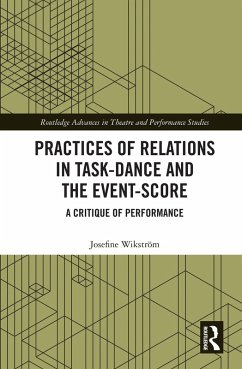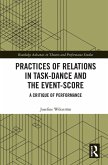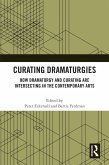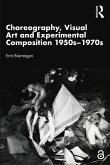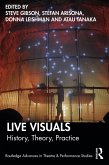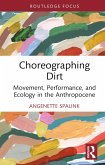Josefine Wikström
Practices of Relations in Task-Dance and the Event-Score (eBook, PDF)
A Critique of Performance
42,95 €
42,95 €
inkl. MwSt.
Sofort per Download lieferbar

21 °P sammeln
42,95 €
Als Download kaufen

42,95 €
inkl. MwSt.
Sofort per Download lieferbar

21 °P sammeln
Jetzt verschenken
Alle Infos zum eBook verschenken
42,95 €
inkl. MwSt.
Sofort per Download lieferbar
Alle Infos zum eBook verschenken

21 °P sammeln
Josefine Wikström
Practices of Relations in Task-Dance and the Event-Score (eBook, PDF)
A Critique of Performance
- Format: PDF
- Merkliste
- Auf die Merkliste
- Bewerten Bewerten
- Teilen
- Produkt teilen
- Produkterinnerung
- Produkterinnerung

Bitte loggen Sie sich zunächst in Ihr Kundenkonto ein oder registrieren Sie sich bei
bücher.de, um das eBook-Abo tolino select nutzen zu können.
Hier können Sie sich einloggen
Hier können Sie sich einloggen
Sie sind bereits eingeloggt. Klicken Sie auf 2. tolino select Abo, um fortzufahren.

Bitte loggen Sie sich zunächst in Ihr Kundenkonto ein oder registrieren Sie sich bei bücher.de, um das eBook-Abo tolino select nutzen zu können.
This book confronts and criticises the way in which the dominating concept of performance has been used in Art Theory, Performance- and Dance Studies. Practices of Relations in Event-Score and Task-Dance Practices will be of great interest to scholars, students and practitioner across dance, performance art, aesthetics and art theory.
- Geräte: PC
- mit Kopierschutz
- eBook Hilfe
Andere Kunden interessierten sich auch für
![Practices of Relations in Task-Dance and the Event-Score (eBook, ePUB) Practices of Relations in Task-Dance and the Event-Score (eBook, ePUB)]() Josefine WikströmPractices of Relations in Task-Dance and the Event-Score (eBook, ePUB)42,95 €
Josefine WikströmPractices of Relations in Task-Dance and the Event-Score (eBook, ePUB)42,95 €![Curating Dramaturgies (eBook, PDF) Curating Dramaturgies (eBook, PDF)]() Curating Dramaturgies (eBook, PDF)43,95 €
Curating Dramaturgies (eBook, PDF)43,95 €![Choreography, Visual Art and Experimental Composition 1950s-1970s (eBook, PDF) Choreography, Visual Art and Experimental Composition 1950s-1970s (eBook, PDF)]() Erin BranniganChoreography, Visual Art and Experimental Composition 1950s-1970s (eBook, PDF)37,95 €
Erin BranniganChoreography, Visual Art and Experimental Composition 1950s-1970s (eBook, PDF)37,95 €![Live Visuals (eBook, PDF) Live Visuals (eBook, PDF)]() Live Visuals (eBook, PDF)54,95 €
Live Visuals (eBook, PDF)54,95 €![Progressive Perspective Drawing for Theatrical Scene Design (eBook, PDF) Progressive Perspective Drawing for Theatrical Scene Design (eBook, PDF)]() Dunsi DaiProgressive Perspective Drawing for Theatrical Scene Design (eBook, PDF)30,95 €
Dunsi DaiProgressive Perspective Drawing for Theatrical Scene Design (eBook, PDF)30,95 €![Singularities (eBook, PDF) Singularities (eBook, PDF)]() Andre LepeckiSingularities (eBook, PDF)40,95 €
Andre LepeckiSingularities (eBook, PDF)40,95 €![Choreographing Dirt (eBook, PDF) Choreographing Dirt (eBook, PDF)]() Angenette SpalinkChoreographing Dirt (eBook, PDF)23,95 €
Angenette SpalinkChoreographing Dirt (eBook, PDF)23,95 €-
-
-
This book confronts and criticises the way in which the dominating concept of performance has been used in Art Theory, Performance- and Dance Studies. Practices of Relations in Event-Score and Task-Dance Practices will be of great interest to scholars, students and practitioner across dance, performance art, aesthetics and art theory.
Hinweis: Dieser Artikel kann nur an eine deutsche Lieferadresse ausgeliefert werden.
Dieser Download kann aus rechtlichen Gründen nur mit Rechnungsadresse in A, B, BG, CY, CZ, D, DK, EW, E, FIN, F, GR, HR, H, IRL, I, LT, L, LR, M, NL, PL, P, R, S, SLO, SK ausgeliefert werden.
Hinweis: Dieser Artikel kann nur an eine deutsche Lieferadresse ausgeliefert werden.
Produktdetails
- Produktdetails
- Verlag: Taylor & Francis eBooks
- Seitenzahl: 170
- Erscheinungstermin: 29. Oktober 2020
- Englisch
- ISBN-13: 9781000215670
- Artikelnr.: 60300233
- Verlag: Taylor & Francis eBooks
- Seitenzahl: 170
- Erscheinungstermin: 29. Oktober 2020
- Englisch
- ISBN-13: 9781000215670
- Artikelnr.: 60300233
- Herstellerkennzeichnung Die Herstellerinformationen sind derzeit nicht verfügbar.
Josefine Wikström is Associate Professor of Dance Theory at Stockholm University of the Arts.
Content
Acknowledgements
Introduction: From a cultural to a critical concept of performance
* Performance, performativity and its disciples
* Marx's epistemology: A critical methodology
* Post-mediality and a generic concept of performance
* Task-Dance and the Event-Score: Epistemological Problems
Chapter 1. Practice: Performance a practice of relations
1. Practice and a metaphysics of practice in Aristotle
2. From action painting to performance art
3. From musical modernism to performance in general
4. Marx's relational practice: Smith, Hegel and Feuerbach
5. Performance, a practice of relations
Chapter 2. Experience: Art as experience or an art to experience?
2.1. Dewey's concept of experience: Unmediated interaction
2.2. Art as experience: Ono and Forti
2.3. Critical limits of Dewey's experience: Kant versus Dewey
Chapter 3. Object: Acts of negations of the medium-specific art object
3.1. The minimalist and the de-materialised object
3.2. From independent things to acts of the subject
3.2. Dance and event as object: Kant
3.3. Phenomenal objectivities in task-dance and event-score practices:
Husserl
Chapter 4. Abstraction: Task-dance's abstract ontology
4.1. Rainer's No-Manifesto and other negations
4.2. The social form of abstract labour: Marx
4.3. The autonomous artwork in Adorno
4.4. Division of labour, abstract time and the disciplined body.
Chapter 5. Structure: The performative structure-object
5.1. Structural objects in task-dance and in structuralism: Trisha Brown'
Accumulation
5.2. The Performativity of the Cartesian I
5.3. Labour in general, art in general, performance in general
Notes
Bibliography
Index of names
Subject index
Index of works
Acknowledgements
Introduction: From a cultural to a critical concept of performance
* Performance, performativity and its disciples
* Marx's epistemology: A critical methodology
* Post-mediality and a generic concept of performance
* Task-Dance and the Event-Score: Epistemological Problems
Chapter 1. Practice: Performance a practice of relations
1. Practice and a metaphysics of practice in Aristotle
2. From action painting to performance art
3. From musical modernism to performance in general
4. Marx's relational practice: Smith, Hegel and Feuerbach
5. Performance, a practice of relations
Chapter 2. Experience: Art as experience or an art to experience?
2.1. Dewey's concept of experience: Unmediated interaction
2.2. Art as experience: Ono and Forti
2.3. Critical limits of Dewey's experience: Kant versus Dewey
Chapter 3. Object: Acts of negations of the medium-specific art object
3.1. The minimalist and the de-materialised object
3.2. From independent things to acts of the subject
3.2. Dance and event as object: Kant
3.3. Phenomenal objectivities in task-dance and event-score practices:
Husserl
Chapter 4. Abstraction: Task-dance's abstract ontology
4.1. Rainer's No-Manifesto and other negations
4.2. The social form of abstract labour: Marx
4.3. The autonomous artwork in Adorno
4.4. Division of labour, abstract time and the disciplined body.
Chapter 5. Structure: The performative structure-object
5.1. Structural objects in task-dance and in structuralism: Trisha Brown'
Accumulation
5.2. The Performativity of the Cartesian I
5.3. Labour in general, art in general, performance in general
Notes
Bibliography
Index of names
Subject index
Index of works
Content
Acknowledgements
Introduction: From a cultural to a critical concept of performance
Chapter 1. Practice: Performance a practice of relations
Chapter 2. Experience: Art as experience or an art to experience?
2.1. Dewey's concept of experience: Unmediated interaction
2.2. Art as experience: Ono and Forti
2.3. Critical limits of Dewey's experience: Kant versus Dewey
Chapter 3. Object: Acts of negations of the medium-specific art object
3.1. The minimalist and the de-materialised object
3.2. From independent things to acts of the subject
3.2. Dance and event as object: Kant
3.3. Phenomenal objectivities in task-dance and event-score practices: Husserl
Chapter 4. Abstraction: Task-dance's abstract ontology
4.1. Rainer's No-Manifesto and other negations
4.2. The social form of abstract labour: Marx
4.3. The autonomous artwork in Adorno
4.4. Division of labour, abstract time and the disciplined body.
Chapter 5. Structure: The performative structure-object
5.1. Structural objects in task-dance and in structuralism: Trisha Brown' Accumulation
5.2. The Performativity of the Cartesian I
5.3. Labour in general, art in general, performance in general
Notes
Bibliography
Index of names
Subject index
Index of works
Acknowledgements
Introduction: From a cultural to a critical concept of performance
- Performance, performativity and its disciples
- Marx's epistemology: A critical methodology
- Post-mediality and a generic concept of performance
- Task-Dance and the Event-Score: Epistemological Problems
Chapter 1. Practice: Performance a practice of relations
- Practice and a metaphysics of practice in Aristotle
- From action painting to performance art
- From musical modernism to performance in general
- Marx's relational practice: Smith, Hegel and Feuerbach
- Performance, a practice of relations
Chapter 2. Experience: Art as experience or an art to experience?
2.1. Dewey's concept of experience: Unmediated interaction
2.2. Art as experience: Ono and Forti
2.3. Critical limits of Dewey's experience: Kant versus Dewey
Chapter 3. Object: Acts of negations of the medium-specific art object
3.1. The minimalist and the de-materialised object
3.2. From independent things to acts of the subject
3.2. Dance and event as object: Kant
3.3. Phenomenal objectivities in task-dance and event-score practices: Husserl
Chapter 4. Abstraction: Task-dance's abstract ontology
4.1. Rainer's No-Manifesto and other negations
4.2. The social form of abstract labour: Marx
4.3. The autonomous artwork in Adorno
4.4. Division of labour, abstract time and the disciplined body.
Chapter 5. Structure: The performative structure-object
5.1. Structural objects in task-dance and in structuralism: Trisha Brown' Accumulation
5.2. The Performativity of the Cartesian I
5.3. Labour in general, art in general, performance in general
Notes
Bibliography
Index of names
Subject index
Index of works
Content
Acknowledgements
Introduction: From a cultural to a critical concept of performance
* Performance, performativity and its disciples
* Marx's epistemology: A critical methodology
* Post-mediality and a generic concept of performance
* Task-Dance and the Event-Score: Epistemological Problems
Chapter 1. Practice: Performance a practice of relations
1. Practice and a metaphysics of practice in Aristotle
2. From action painting to performance art
3. From musical modernism to performance in general
4. Marx's relational practice: Smith, Hegel and Feuerbach
5. Performance, a practice of relations
Chapter 2. Experience: Art as experience or an art to experience?
2.1. Dewey's concept of experience: Unmediated interaction
2.2. Art as experience: Ono and Forti
2.3. Critical limits of Dewey's experience: Kant versus Dewey
Chapter 3. Object: Acts of negations of the medium-specific art object
3.1. The minimalist and the de-materialised object
3.2. From independent things to acts of the subject
3.2. Dance and event as object: Kant
3.3. Phenomenal objectivities in task-dance and event-score practices:
Husserl
Chapter 4. Abstraction: Task-dance's abstract ontology
4.1. Rainer's No-Manifesto and other negations
4.2. The social form of abstract labour: Marx
4.3. The autonomous artwork in Adorno
4.4. Division of labour, abstract time and the disciplined body.
Chapter 5. Structure: The performative structure-object
5.1. Structural objects in task-dance and in structuralism: Trisha Brown'
Accumulation
5.2. The Performativity of the Cartesian I
5.3. Labour in general, art in general, performance in general
Notes
Bibliography
Index of names
Subject index
Index of works
Acknowledgements
Introduction: From a cultural to a critical concept of performance
* Performance, performativity and its disciples
* Marx's epistemology: A critical methodology
* Post-mediality and a generic concept of performance
* Task-Dance and the Event-Score: Epistemological Problems
Chapter 1. Practice: Performance a practice of relations
1. Practice and a metaphysics of practice in Aristotle
2. From action painting to performance art
3. From musical modernism to performance in general
4. Marx's relational practice: Smith, Hegel and Feuerbach
5. Performance, a practice of relations
Chapter 2. Experience: Art as experience or an art to experience?
2.1. Dewey's concept of experience: Unmediated interaction
2.2. Art as experience: Ono and Forti
2.3. Critical limits of Dewey's experience: Kant versus Dewey
Chapter 3. Object: Acts of negations of the medium-specific art object
3.1. The minimalist and the de-materialised object
3.2. From independent things to acts of the subject
3.2. Dance and event as object: Kant
3.3. Phenomenal objectivities in task-dance and event-score practices:
Husserl
Chapter 4. Abstraction: Task-dance's abstract ontology
4.1. Rainer's No-Manifesto and other negations
4.2. The social form of abstract labour: Marx
4.3. The autonomous artwork in Adorno
4.4. Division of labour, abstract time and the disciplined body.
Chapter 5. Structure: The performative structure-object
5.1. Structural objects in task-dance and in structuralism: Trisha Brown'
Accumulation
5.2. The Performativity of the Cartesian I
5.3. Labour in general, art in general, performance in general
Notes
Bibliography
Index of names
Subject index
Index of works
Content
Acknowledgements
Introduction: From a cultural to a critical concept of performance
Chapter 1. Practice: Performance a practice of relations
Chapter 2. Experience: Art as experience or an art to experience?
2.1. Dewey's concept of experience: Unmediated interaction
2.2. Art as experience: Ono and Forti
2.3. Critical limits of Dewey's experience: Kant versus Dewey
Chapter 3. Object: Acts of negations of the medium-specific art object
3.1. The minimalist and the de-materialised object
3.2. From independent things to acts of the subject
3.2. Dance and event as object: Kant
3.3. Phenomenal objectivities in task-dance and event-score practices: Husserl
Chapter 4. Abstraction: Task-dance's abstract ontology
4.1. Rainer's No-Manifesto and other negations
4.2. The social form of abstract labour: Marx
4.3. The autonomous artwork in Adorno
4.4. Division of labour, abstract time and the disciplined body.
Chapter 5. Structure: The performative structure-object
5.1. Structural objects in task-dance and in structuralism: Trisha Brown' Accumulation
5.2. The Performativity of the Cartesian I
5.3. Labour in general, art in general, performance in general
Notes
Bibliography
Index of names
Subject index
Index of works
Acknowledgements
Introduction: From a cultural to a critical concept of performance
- Performance, performativity and its disciples
- Marx's epistemology: A critical methodology
- Post-mediality and a generic concept of performance
- Task-Dance and the Event-Score: Epistemological Problems
Chapter 1. Practice: Performance a practice of relations
- Practice and a metaphysics of practice in Aristotle
- From action painting to performance art
- From musical modernism to performance in general
- Marx's relational practice: Smith, Hegel and Feuerbach
- Performance, a practice of relations
Chapter 2. Experience: Art as experience or an art to experience?
2.1. Dewey's concept of experience: Unmediated interaction
2.2. Art as experience: Ono and Forti
2.3. Critical limits of Dewey's experience: Kant versus Dewey
Chapter 3. Object: Acts of negations of the medium-specific art object
3.1. The minimalist and the de-materialised object
3.2. From independent things to acts of the subject
3.2. Dance and event as object: Kant
3.3. Phenomenal objectivities in task-dance and event-score practices: Husserl
Chapter 4. Abstraction: Task-dance's abstract ontology
4.1. Rainer's No-Manifesto and other negations
4.2. The social form of abstract labour: Marx
4.3. The autonomous artwork in Adorno
4.4. Division of labour, abstract time and the disciplined body.
Chapter 5. Structure: The performative structure-object
5.1. Structural objects in task-dance and in structuralism: Trisha Brown' Accumulation
5.2. The Performativity of the Cartesian I
5.3. Labour in general, art in general, performance in general
Notes
Bibliography
Index of names
Subject index
Index of works
